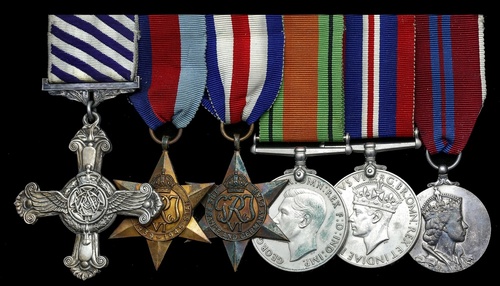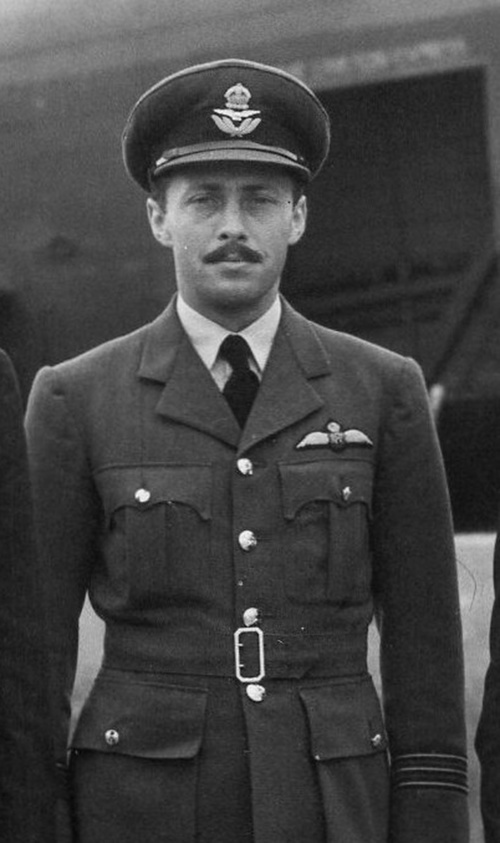Auction: 17002 - Orders, Decorations and Medals
Lot: 394
Sold by Order of a Direct Descendant
'When acting as Deputy Leader of the Group Formation in the daylight attack on Cologne on 28 January 1945, the three leading aircraft were hit by accurate heavy flak, three minutes before the point of bomb release, two aircraft in the formation being shot down. His own aircraft sustained heavy flak damage which rendered the front turret and an item of special equipment unserviceable, damaged the airscrew lever quadrant, jamming the controls, and severely damaged the trimming controls beside the pilot's seat, rendering them unserviceable.
In spite of this Wing Commander Smith, with superb courage and airmanship, completed his bombing run successfully and set course for base, where he landed safely after temporary repairs has been effected with difficulty to the essential aircraft controls … '
The original recommendation for the D.F.C. awarded to Wing Commander W. J. Smith, refers.
A fine Second World War Squadron C.O's D.F.C. group of six awarded to Wing Commander W. J. 'The Vicar' Smith, Royal Air Force, who flew operationally as a Flight Commander in No. 115 Squadron and as C.O. of No. 218 (Gold Coast) Squadron: a disciplinarian of steely resolve, he evoked mixed feelings amongst 218's aircrew, but none doubted his gallantry and example in the air
Distinguished Flying Cross, G.VI.R., the reverse officially dated '1945', with its Royal Mint case of issue; 1939-45 Star; France and Germany Star; Defence and War Medals 1939-45; Coronation 1953, together with the recipient's identity discs and a set of related miniature dress medals, generally good very fine (14)
D.F.C. London Gazette 16 November 1945. The original recommendation states:
'Wing Commander Smith has completed 23 operational sorties against the enemy as a Flight and Squadron Commander in Bomber Command. Among the heavily defended targets he has attacked are Cologne (2), Dortmund, Duisburg, Bremen and Dresden.
As pilot and Captain of Aircraft this officer has displayed the highest degree of skill, determination and devotion to duty. He has on several occasions led Squadron and Base Formations with conspicuous ability and outstanding success. On one occasion he led the Group Formation.
When acting as Deputy Leader of the Group Formation in the daylight attack on Cologne on 28 January 1945, the three leading aircraft were hit by accurate heavy flak, three minutes before the point of bomb release, two aircraft in the formation being shot down. His own aircraft sustained heavy flak damage which rendered the front turret and an item of special equipment unserviceable, damaged the airscrew lever quadrant, jamming the controls, and severely damaged the trimming controls beside the pilot's seat, rendering them unserviceable. In spite of this Wing Commander Smith, with superb courage and airmanship, completed his bombing run successfully and set course for base, where he landed safely after temporary repairs has been effected with difficulty to the essential aircraft controls.
In his capacity as Squadron Commander, this officer has displayed an equally high standard of determination, ability and devotion to duty. He has at all times shown inflexible resolve in bringing the Squadron to the highest pitch of operational efficiency and has always insisted on the highest standard of discipline amongst his aircrew both in the air and on the ground.
The success attained by his squadron must be attributed in large measure to his precept and example and to his insistence that for operations only the best is good enough. His briefing of aircrew before operations is always concise, lucid and thorough, and this has been an important factor in the success of many difficult operations carried out by his squadron.
All members of his squadron appreciate his outstanding contribution to the Squadron's efforts and look up to him as a fine leader. I wish to recommend Wing Commander Smith for the award of the Distinguished Flying Cross.'
William John Smith joined the R.A.F. as a pilot under training in the summer of 1936 and, having been commissioned Pilot Officer in July 1937, joined No. 52 (Bomber) Squadron at R.A.F. Upwood.
Advanced to Flight Lieutenant in September 1940, whilst serving at the R.A.F. College, Cranwell, he was embarked for Canada as an instructor in September 1941, and remained similarly employed until returning home in May 1943.
Having then served at R.A.F. Shawbury, he was promoted to Squadron Leader and took command of 'B' Flight in No. 115 Squadron, a Lancaster unit operating out of R.A.F. Witchford, in August 1944: thus ensued a spate of operational - often daylight - sorties to targets in France, seven of them in the same month, in addition to a strike on Bremen on the 18th.
In September he led his Flight to Le Havre on two occasions, in addition to Calais and Kemen, and in October he attacked Saarbrucken, Dortmund and Duisburg. Advanced to the temporary rank of Wing Commander in the same month, he was next appointed to the command of No. 218 (Gold Coast) Squadron, another Lancaster unit, operating out of R.A.F. Chedburgh.
It was here, as cited above, that he displayed 'inflexible resolve in bringing the Squadron to the highest pitch of operational efficiency' and 'insisted on the highest standard of discipline amongst his aircrew both in the air and on the ground'. On the ground at least, that resolve may have proved unpopular in certain quarters, but Smith's personal example in the air was imbued with all the hallmarks of exceptional leadership and courage; his 'concise, lucid and thorough' pre-raid briefings were conducted from a 'pulpit-like podium' and led to his nickname - 'The Vicar'.
The burdens of squadron command clearly took their toll during his time in 218 Squadron: he was admitted to Ely Hospital, Cambridgeshire in December 1944.
On returning to an operational footing in January 1945 - and as cited in the recommendation for his D.F.C. - he acted as Deputy Group Leader in a daylight strike on Cologne and displayed 'superb courage' in continuing to the target after his Lancaster was severely damaged by flak; in the following month, he led 218's attack on Dresden on the night of the 13th-14th, the first of four successive strikes on the city that culminated in the notorious 'firestorm' and an estimated total of 22,000 casualties. He flew his final sortie as Squadron C.O. on the night of 14th-15th, when 218 attacked Datteln.
Smith ended the war with an appointment at No. 3 Group, Bomber Command and was placed on the Retired List in the rank of Wing Commander in February 1958. He died in Wokingham in March 2004.
Sold with the recipient's original R.A.F. Pilot's Flying Log Books (3), covering the periods July 1936 to May 1937, June 1937 to March 1943, and July 1943 to November 1957, together with Buckingham Palace D.F.C. forwarding letter.
Additional reference sources:
https://218squadron.wordpress.com/wing-commander-william-john-smith-dfc/
Subject to 20% VAT on Buyer’s Premium. For more information please view Terms and Conditions for Buyers.
Sold for
£2,000







